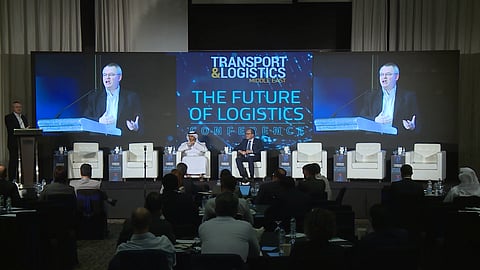Data Sharing and Integration Will Make the Supply Chain More Resilient
The next question in the Shipping & Ports session asked by host of the Future of Logistics conference, Lars Jensen, was how ports could be made more resilient through the use of data and technology? Rather than building more physical assets.
Panellists for the session were:
Shahab Al Jassmi, Commercial Director of Ports and Terminals, DP World
Kim Larsen, VP of Commercial & Business Development, Abu Dhabi Ports
Lars Jensen, CEO & Partner, Vespucci Maritime
Kim Larsen in his reply said that the UAE government had always pushed for greater digitalization levels in the shipping and ports industry and as a country the UAE has an excellent chance of being a frontrunner in digital development.
Mr Larsen added that one of the terminals at Khalifa Port was the largest semi-automated terminals of its kind in the world and had become a benchmark for other ports in the industry to follow. The high degree of automation of the terminal has allowed several operations to be handled remotely and safely during the pandemic.
As for complete automation, according to Mr Larsen the few fully automated ports that exist today have still not achieved the desired level of productivity. So he felt that they were a work in progress and will take some more time to realize the full promise of automation.
Another important point made by Mr Larsen was that digitalisation and automation cannot be done in isolation if one has to realise its full benefits and it has to be implemented across the shipping and ports industries which have traditionally been slow to adopt new technologies.
Mr Larsen concluded by saying that the UAE had a distinct advantage over other countries as it had a very supportive government that encouraged industry to constantly upgrade its technological base with Dubai and Abu Dhabi serving as great examples for the long-term benefits of investments in technology.
Mr Al Jassmi said that technology has always been the backbone of UAE’s industrial strategy and it has proven to be the right strategy particularly during the pandemic when supply chain continuity could be maintained thanks to prior investments in robust, technologically advanced infrastructure.
According to Mr Al Jassmi the maritime industry has been slow to adopt new technology compared to aviation. However, Jebel Ali has been at the forefront of automation and digitalisation so it has managed to eliminate or reduce human intervention in operations at every stage.
Mr Al Jassmi added that Jebel Ali has always tried to involve customers in what they were doing by implementing technologies like EDI and blockchain while continuously holding discussions with customers on how they can improve systems.
Describing the Boxbay project Mr Al Jassmi said its concept and viability have been proven by now and it is going to cause a major disruption in port and terminal management as it is going to save a lot of time and costs with containers moving from vessel to terminal, and vice versa, using an entirely automated system.
“In the last year all stakeholders have been investing heavily in integrating processes and the good part is that today the language that we hear from everyone shows that they are willing to put in time and effort to exchange information which was not the case two years ago,” concluded Mr Al Jassmi.
Read More: The Solution to a Demand Spike Lies in Innovation Not Overcapacity


